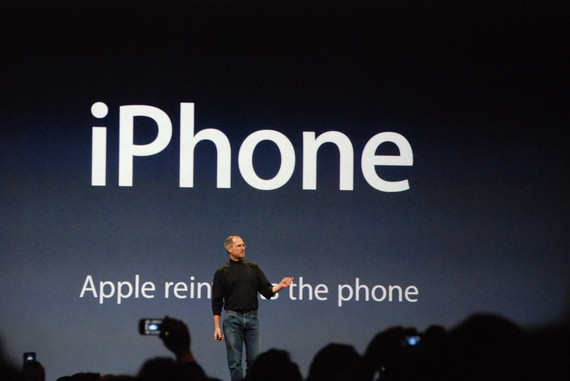In January of 2007, Steve Jobs introduced the iPhone to the world. Email. iPod. Internet communicator. It was power in the palm of your hand. The smartphone extended our abilities by taking certain tasks and automating them from recipe organization to reducing a smoking habit. It became our personal assistant freeing us up to do other things. Rather than taking the time to purchase a map, we could type in an address and be on our way. Rather than waiting till we got home, we had access to Google and email anywhere. Jobs promised it would change the world, and it did.
My phone has connected me to invaluable information on everything from health issues, travel tips and love advice. Even more cherished, it has given me eyes and ears to my loved ones around the globe. The same device, which provided the ultimate connection, now provides constant static, a deluge of incoming load.
Google, Twitter, Facebook, oh my! Anything you want to know is at the power of your fingertips. Dinner conversations have become filled with Instagram photo shares, Google fact checks, text message interruptions, Twitter bathroom breaks, and Facebook show-and-tells with cute kid photos and home design projects. Topics switch gears at light speed like watching Gossip Girl on fast forward. Similar to a web browser filled with 20 tabs, our conversations have become littered with vast amounts of information much of which gets closed at the end of the day and forgotten.
It is the age of forgetfulness.
The Internet is a massive place and having access to its endless data 24 hours a day is making us more forgetful. With all this data, the intention was that mankind would be bettered. However, with too much of any good thing, breakage occurs. Wonderful things have become overshadowed with meaningless tasks and endless reactivity.
Cognitive load is defined as the load we put on our brains with regard to working memory. Working memory, as compared to long-term memory, can only store three to five pieces of data at any one time (in young adults). Thus, it is vulnerable to overload. Long-term memory appears to have an endless capacity. Information is transferred back and forth from working memory to long-term memory. When the cognitive load overwhelms the working memory, it's like trying to park a 747 in a one-car garage. It is impossible.
Today, I cannot remember even simply tasks like "shave" or "walk the dog" without a digital reminder. If my calendar was erased, and I shudder at the thought, I would have absolutely no idea what to do for the day. Many conversations end with one party asking the other to remind them about a follow-up, as they will not. Emails and text messages go unanswered because they are forgotten. Meetings and brainstorms lack follow-ups. We've gone from a small group of friends to thousands of Facebook connections, which jumble our News Feeds with a procession of daily activities. Many of us forget our mother's birthday, where we need to be in five minutes, and/or whether we ate lunch today.
Consider this. According to The Telegraph, the average person checks their phone 200 times a day, or every seven minutes. The sponge can only hold so much water before it leaks out all over the table. This amount of cognitive load is vast. There was a time before you had that smartphone. What did you do with your day?
I am neither psychologist nor neuroscientist. My investigation into this subject began after intense personal reflection. I discovered that there were several moments in which I would black out on the last five to 10 minutes of conversation completely. I could no longer read as one sentence would be forgotten as I progressed to the next.
Our technology is meant to empower. Instead, the screens are starting to have the upper hand as we use them as crutches for data access and emotional relief. We are capable of many tasks without them but as we hold their little touch screen in ours, the dependence grows. This reliance coerces a constant check-in on email and increased reactivity to text messages. More back-and-forth communication leads to more cognitive load and hence, more forgetfulness.
One of the greatest innovators of our time was aware of the boundaries necessary to focus.
People think focus means saying yes to the thing you've got to focus on. But that's not what it means at all. It means saying no to the hundred other good ideas that there are. You have to pick carefully. I'm actually as proud of the things we haven't done as the things I have done. Innovation is saying 'no' to 1,000 things. -- Steve Jobs
At some point, what needs to be said no to is so great, that simply not responding becomes easier. Most likely the other party will forget they reached out in the first place. Forgetfulness has become the expectation rather than the exception to the rule. Focus demands a mindful usage and saying no to the deluge of meaningless communication by creating boundaries. OK. Thx. Np. Cool. No worries.
After leaving a popular start-up, a friend passed on that he noticed he wasn't receiving the same terror-inducing levels of email. At first, he considered that this might be because he was no longer in the hot seat as cofounder of a start-up. The truth, however, was that he had now focused his time on traveling the globe and was not responding to email with as much frequency. Because of this, the fire hose slowed to a trickle. By communicating less, less was thrown back in return.
The control is ours. We started email and text messaging Armageddon. We can put boundaries on it and slow the ship down to a manageable level. Hell, we may start remembering some things again.
Point. Set. Match. Brain.
